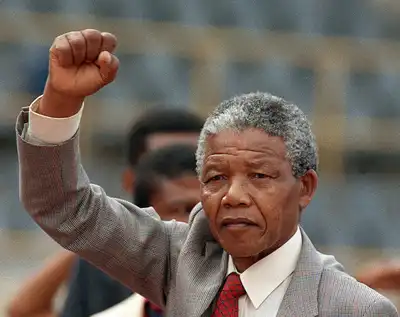What Did Nelson Mandela Do To Rebuild Democracy?

Nelson Mandela, a former president of South Africa and civil rights activist, devoted his life to the fight for equality and finally assisted in the overthrow of that country’s discriminatory apartheid system. Nelson Mandela International Day, which falls on July 18, now honors his accomplishments every year.
Biography of Nelson Mandela.
On July 18, 1918, Nelson Mandela was born in the British Empire colony known at the time as the Union of South Africa. Despite the fact that the majority of its residents were Black, Nelson Mandela was South Africa’s first black president. He was elected president of South Africa in 1994 after serving 27 years in prison for fighting apartheid. He was well-known in South Africa for his leadership and activism against inequality. Mandela’s royal blood—and connections—gave him entrance to the University of Fort Hare, the only university in the nation that was exclusively for Black students, while his complexion consigned him to the lowest social tier in segregated South Africa. He developed into an activist there and was expelled for criticizing the under-resourced student government. As a form of retribution for dropping out of school, his family wanted him to attend an arranged marriage when he returned to his little community on the eastern Cape. So, in 1941, he made his way to Soweto, South Africa’s largest Black metropolis.
What was Mandela’s Impact On South Africa?
Opposition Of Apartheid
Mandela established the first Black law firm in the country after enrolling as a part-time law student. He became a member of the African National Congress, the party that fought for the civil rights of South Africans. In 1948, South Africa’s ruling party legally accepted apartheid, or apartness.
Mandela, who oversaw a large coalition government that enacted a new constitution, placed an emphasis on racial harmony and established the Truth and Reconciliation Commission to look into historical violations of human rights.
The Truth and Reconciliation Commission, which was established to look into cases of human rights abuses and offer a framework for lessening these crimes, was one of Nelson Mandela’s influences. He was awarded the Nobel Peace Prize in 1993 for his emphasis on the absence of violence.
Mandela established the Nelson Mandela Institute for Rural Development and Education in 2007 with the goal of preparing and deploying top-notch educators to rural areas and furnishing schools with contemporary infrastructure.
In his very first televised interview as an anti-Apartheid fighter, Nelson Mandela made one demand very clear in 1961. Mandela gave a clear answer when asked by journalist Brian Widlake what black Africans hoped to accomplish through their actions: He stated, “The Africans require, demand, and are the foundation of One Man, One Vote—they want political freedom. He continued to say in that interview that the struggle to secure voting rights for black South Africans should be unrelated to race or educational attainment. Mandela would have to wait until the end of Apartheid and his election as president in 1994 to realize his ideal of a multiracial electoral system. In that election, almost 90% of South Africans cast ballots, but since then, turnout has fallen, with 2014 recording under 60%.
- Where Can I Study Teaching in South Africa?
- Where Can I Study Somatology in South Africa
- Where Can I Study Pharmacy in South Africa
- Where Can I Sell Eggs in South Africa
- Where Can I Invest My Money in South Africa?
- Why Is Xenophobia A Problem In South Africa?
- What Time Does the Market Open in South Africa?
- How Many Leaves Per Year in South Africa?
- How to Invest in Amazon from South Africa
Why Nelson Mandela’s work is incomplete and how he fought apartheid
This revolutionary spent his entire life working to eradicate racism; he went from being the most well-known political prisoner in the world to being the first Black president of South Africa. But there are still acts of racism happening all over the world. What he stood for was equality for all men. We need leaders who will rise to his call and fight for injustice around the globe.
Nelson Mandela displayed heroism by acting in a selfless and committed manner, fighting for his people’s freedom and justice, and putting his life in danger to uphold equality for all. The first president of South Africa, Mandela, battled tirelessly for his nation’s freedom and justice.
Share This




